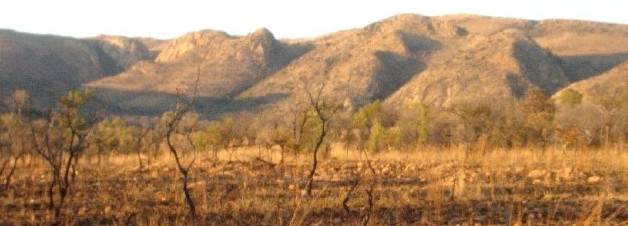A couple of months ago, my resident Peace Corps Safety & Security guy invited me to speak with the new trainees about unwanted attention. Although I don't really think that I've experienced much unwanted attention, other than having a few old and young men grabbing my arm, which really freaked me out, I thought it would be cool to meet and greet the people who are now where I was a year ago. When we first pulled up (on Sunday) to the orientation hall where trainees meet up for technical sessions, we ran into a two guys, who from the moment we saw them, looked like the prototypical trainee (other than being two white guys in middle of a town only composed of Black people). Their white tennis shoes looked like they were fresh out of the box. Their clothes were not yet worn down and tattered from Omo and hand washings. They had sunshiny faces, not yet weighed down by the emotional roller coaster that is Peace Corps service. They weren't yet jaded by bureaucracy (PC and South African), frustrations over teachers who are too lazy to teach, NGO directors with a serious case of founders syndrome, corruption, HIV related death and illness, etc. They haven't yet been inspired by people who seem to make a way out of no way. The questions they posed were full of anxiety and excitement about fitting into their respective communities. If some how Peace Corps or myself as a volunteer could give them a detailed outline of what things were going to be like for them over the next two years, they might have taken it, read it, reread it, highlighted special points, and would have written a list of additional questions they want to have answered.
At one point, I, along with LaQuita, another African American volunteer, had the opportunity to meet up with several of the African American female trainees, to talk about some of the issues that were specific to the "African American experience" in Peace Corps. They expressed some of the same feelings and concerns about the needs and experiences of African American people that are not addressed by Peace Corps during training (and during service I might argue) that LaQuita and I did when we were in their place. They were frustrated that, while some trainees were treated like rock stars in a village (because it is rare and almost unheard of for a White person or someone who is perceived by them as White, to take an intimate interest in their lives), people in the village judged them because they were Black and couldn't speak the language. Some people they encountered called them coconuts (black on the outside, white on the inside) because it was thought that the Black volunteers were really just South Africans who studied abroad and forgot their culture. They were concerned that Peace Corps prepared trainees with an assumption of "whiteness", that everyone's experience would be similar based on the fact that the majority of volunteers are white and because PC has limited experience with the understanding of and dealing with the complexities that a darker skin tone can play in shaping one's Peace Corps experience. Peace Corps doesn't tell you and maybe can't prepare you for the mountain of emotions a Black volunteer may experience after hearing an older, Black woman being called "girl." How can you be prepared to see a Black man riding in the back of a pickup truck in the cold and rain while there is only one person (a White man or woman) riding in the cab? Can Peace Corps tell you that the only way some South Africans, Black or otherwise, know how to greet you is by calling you a "nigger." America has a similar ugly experience with race, discrimination, and inequity. In America, however, we like to pretend that those things don't exist. You're told that "we" weren't responsible for what happened to you; time has passed, you should just "get over it"; etc. While serving in PC South Africa, volunteers are place in situations that mirror what some people with a darker hue (not just African Americans) in America went through in the past and are still going through today, yet have the inability or unwillingness to realize the same or similar reality on their own home soil. These particular trainees found that they lacked being able to commiserate with trainees of other ethnic backgrounds, because they simply "could not understand". They were frustrated at how their fellow trainees looked at them in judgment for making this experience a "black v.s. white", when that's not the point at all, but rather wanting to be recognized rather than being lumped in with the majority. After speaking with our kindred, LaQuita and I recognized the need to serve as a support system for them like we were a support for each other. Additionally, we realized how far we had come, but how we have a long road ahead.
Friday, August 17, 2007
Subscribe to:
Post Comments (Atom)

2 comments:
Nice Blog. This post caught my attention and addresses some similarities to my site. I am a Black American PCV in Ghana. I was on google looking for info on Black Americans experience in the Peace Corps and ran across your Blog. David H (dehiii@hotmail.com)
(I was actually on the same mission as the PCV Ghana post)
Hi, I am a future applicant (2008)...Black American PCV and I believe that in NGO and such we are under represented, so much so, that when people elsewhere see us in some cases they automatically overlook us (Black People from all over the Diaspora) to the more recognized face (White American/European) that may or may not equal assistance. My motivation is to change that aspect in a small way through my service. What do you think? How have our people responded to your commitment? (hevans5@mscd.edu)
Post a Comment